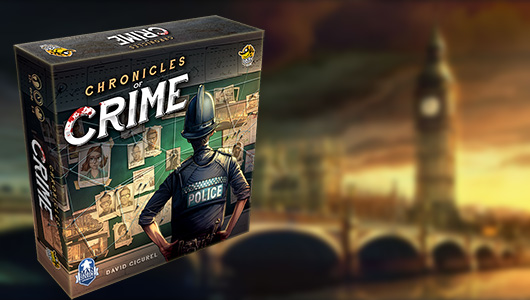Chronicles of Crime is a board game which intends to immerse you in the life of a detective investigating crimes out of Scotland Yard in London. Using various real-world locations, the game is supported by an app and a clever QR-code system that allows for the possibility of telling an unlimited number of stories, while following the format of an open choose-your-own-adventure. Players move around locations, search scenes for clues using an innovative (optionally VR) viewer, then gather evidence, question suspects and present their final solution to the Chief at the end of each episode.
• Publisher: Lucky Duck Games
• Number of Players: 1–4
• Playing Time: 60–90 Minutes

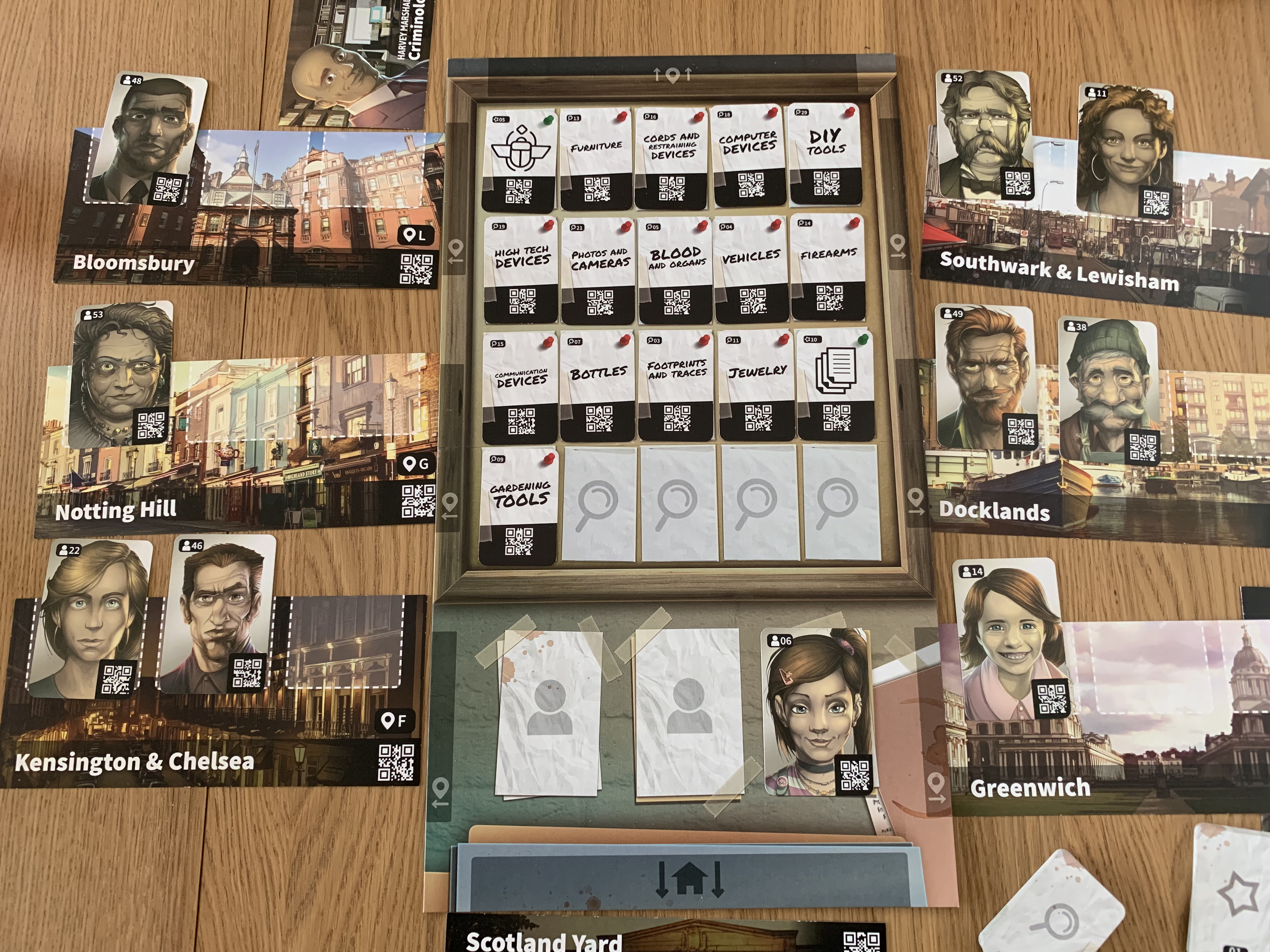
I am a real life detective in the Metropolitan Police, so BRB’s Tim asked me to try this game out to see whether it bears any resemblance to reality. In short, no it doesn’t – but it certainly does make for an entertaining murder mystery game, even if I find it a little overly reliant on the app without a lot of game in between.
Each case opens like a Sherlock Holmes story, with the Chief Officer dishing out the latest mystery to hit Scotland Yard. Everything in CoC is run by the game’s app, with flavour text, conversations and events all controlled through it. The text is a lot less than is found in Sherlock Holmes: Consulting Detctive (the closest game I can think of to this), but it keeps things moving quickly in a group game and it is generally well-written.
Players then move around locations by scanning QR codes through the app. Once there, they might be presented with some more text that indicates which characters or items are present. For these, players then lay out additional cards, each with their own individual QR codes that will be scenario-specific. If you want to talk to the shady character at the back of the bar, scan his QR code. If you want to ask him about the body on the floor, scan the body’s QR code – and so on. Each of these actions takes time, however, and certain in-game events might trigger at a particular moment. Some scenarios also have a time limit, or award bonus points for solving cases faster. Like real life, some witnesses will be helpful, others will disregard you – or maybe even deliberately misguide you.
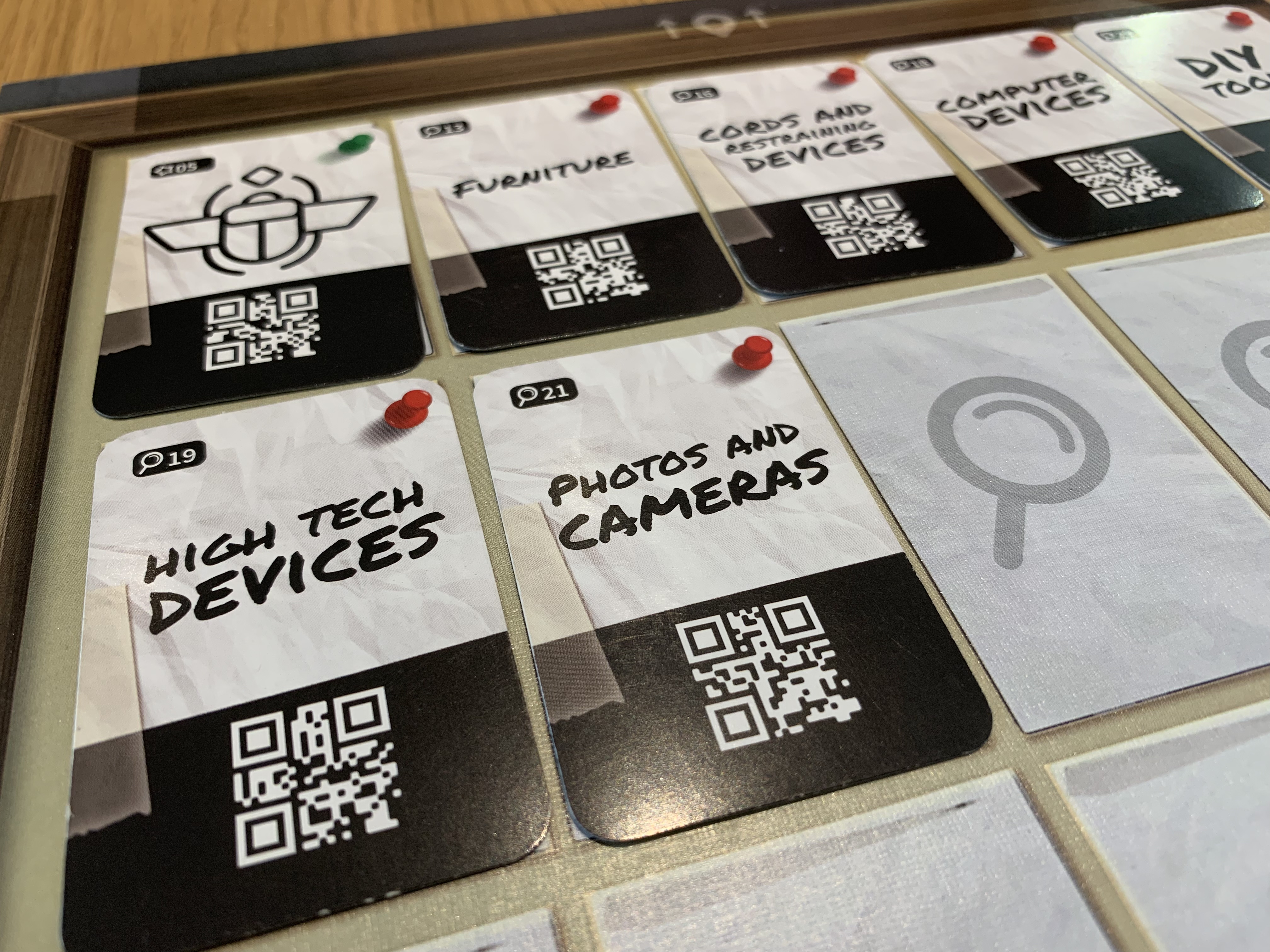
Perhaps the cleverest aspect of Chronicles of Crime is the add-on VR viewer, for which the game comes with a clip-on set of glasses that should fit any mobile phone. In a scene, players can “search for clues”, which then gives them 30 seconds to look around a crime scene in 360-degree Virtual Reality. Players then search the clue deck for things they noticed in the scene that might be relevant to the case: find a knife on the floor, scan the QR code on the “Melee Weapons” card. Or, maybe that blooded handprint should be sampled at the lab. Scan the QR code on “Traces & Marks”, then travel to the lab (by scanning the QR code) and scan it again. Your forensic scientist will tell you whether any interesting DNA comes back from it, maybe suggesting a new character or location for you to explore.
While you’re back at the Yard, you may want to check intelligence files. Find the analyst, scan his QR code, then scan the QR code of any card you want to ask him about. This is the constant theme of CoC: find, scan, and follow the story. It is possible to miss clues, and some things may appear on cards not immediately obvious and some are a little ambiguous at times (is a security camera a “high tech device”, for example, or does it belong in “photos and cameras”?). There are no “turns” as such in Chronicles of Crime, so how players divide actions up between them is largely up to them. This, in my experience, can also tend to leave one player in a “lead” role, with the others simply left to scan things as and when.
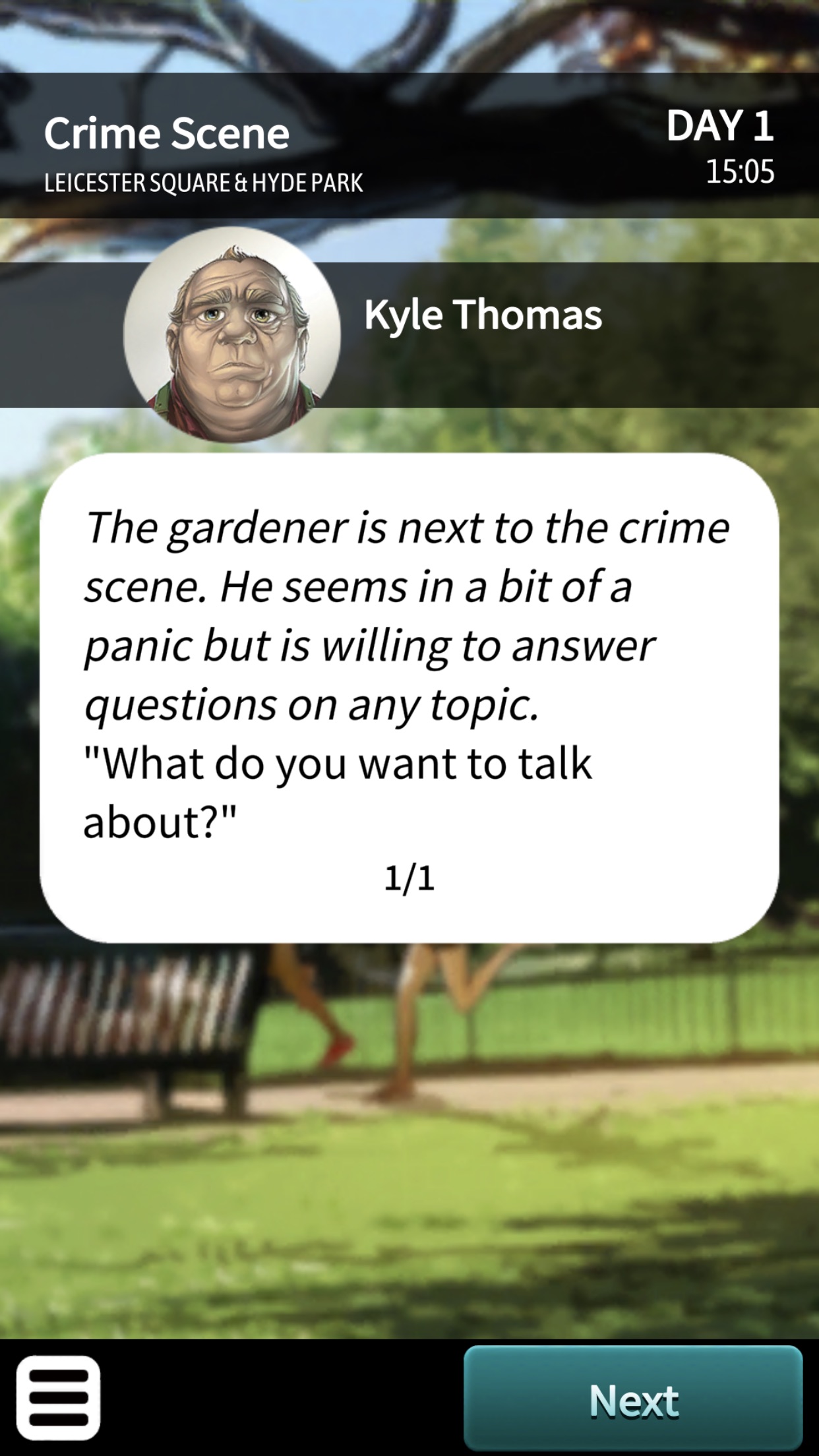
If you feel like my review is making a lot of mentions of QR codes, then you’re getting the right impression of what CoC feels like to play. For me, it’s a little too formulaic and obvious what to do. Character A tells you that Character B was seen in Location C at the time of the murder, presenting a nice linear trail of clues to follow. Eventually, players will progress through scenarios just by sheer virtue of scanning everything, without having to resort to any particular flashes of detective insight. Where Sherlock Holmes: Consulting Detective often requires thought, reasoning and deduction, the comparatively simple mechanics of CoC tempt players to adopt a scattergun approach to scanning things in the hope of finding something interesting. Instead of quizzing Character A about specific subjects, the temptation is there to ask them about everything to do with the case. This can also have the inadvertent effect of making them reveal things that they player should have no way of knowing about at that stage of the case.
While there are penalties for being slow, solving a case will feel like victory enough in itself regardless of the overall score given. I doubt too many people will re-run CoC scenarios very often to improve their score, as all the cases I played really only had one solution. Once you know it, you can’t un-know it. This makes the replayability of any scenario limited, but this is where expansions can come to the rescue.
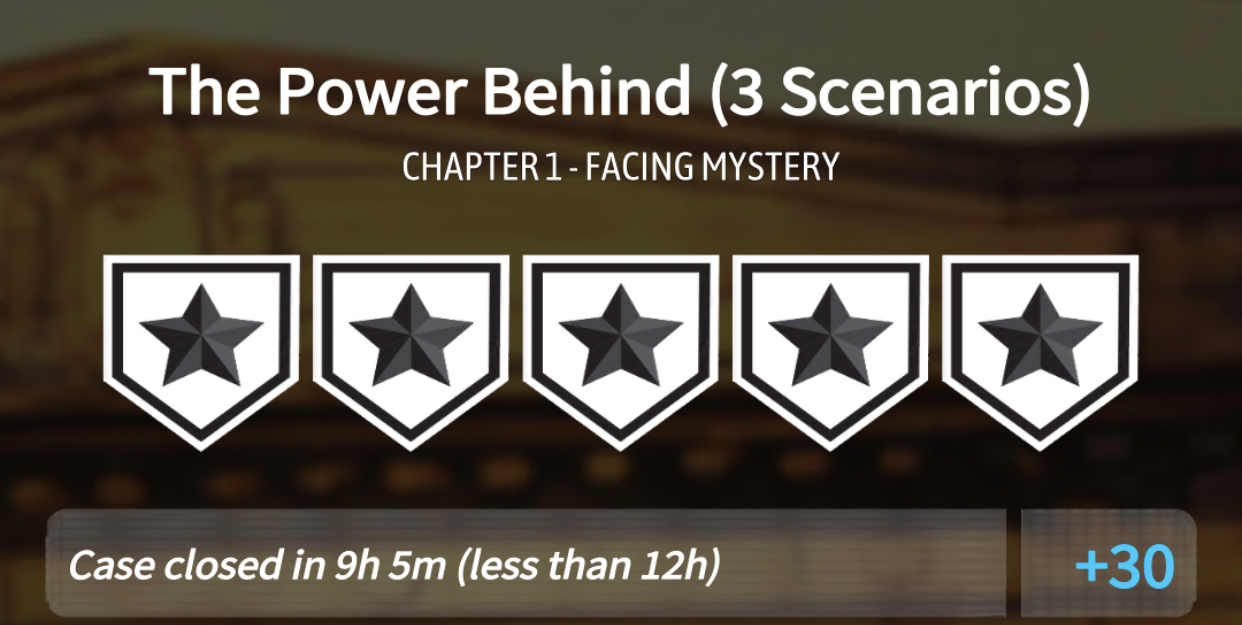
As each QR code is coded specifically to the scenario, the same cards can be used again and again to present a potentially unlimited number of stories. There are several available through the app and the base game comes with three different cases, one of which is a three-parter. There are also a further six to buy (£4.99 each), as well as other commercial box-set releases. Whether they’re worth purchasing or not will depend on how much you enjoy CoC, but if you just stick to the base game then I imagine it will get stale very quickly. Innovative as it is, I would like to have seen it work more as a “system” for players to be able to design their own scenarios (think of something like HeroQuest back in the day) that could sit alongside commercially released products with higher production values and more of the VR crime scenes.
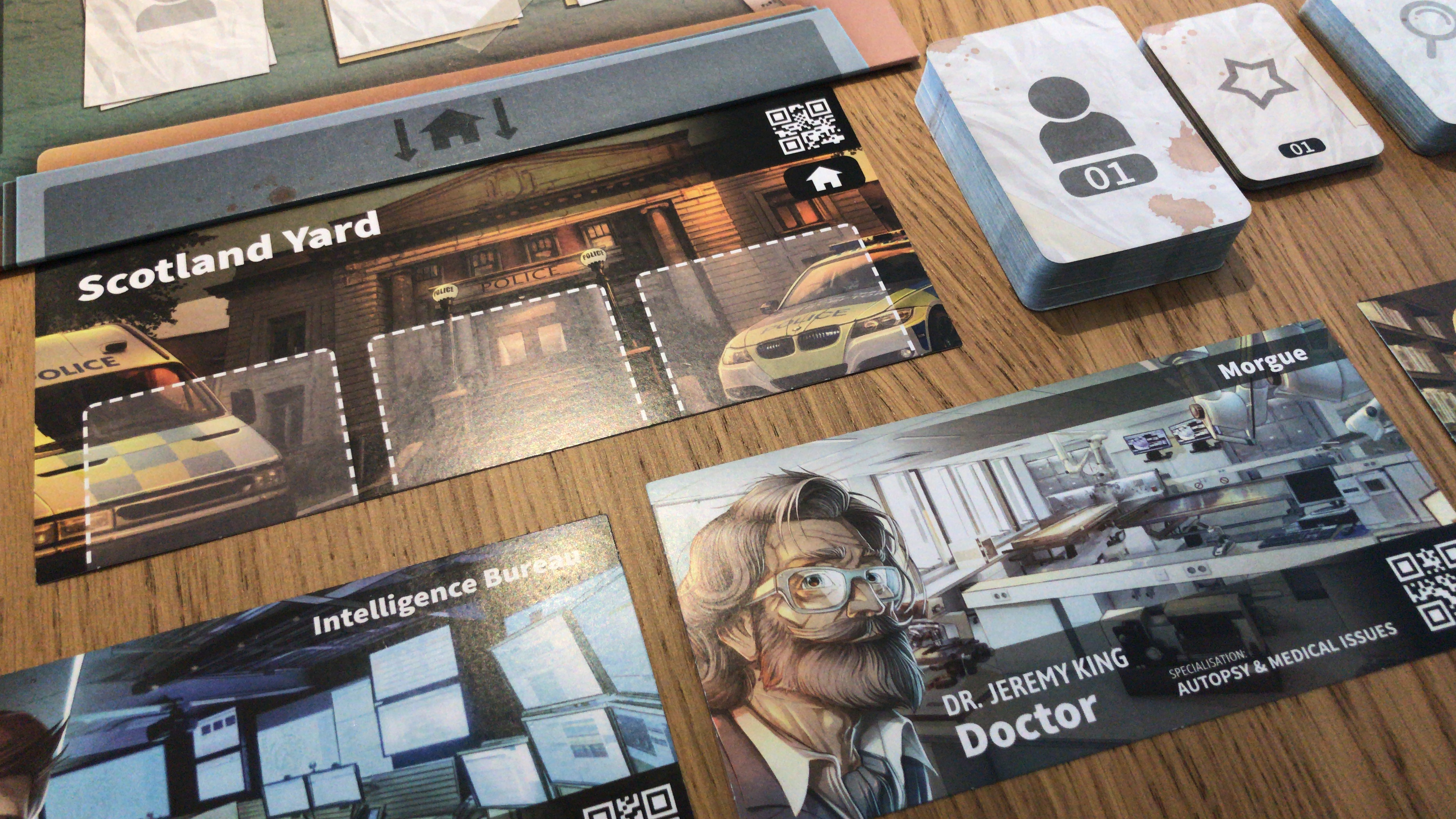
Chronicles of Crime has unmistakably high production values. The comic-book style artwork is bright and colourful, and no two cards or characters are the same. The VR scenes and music really add to the atmosphere of being in a detective-noir novel, and the novelty of the game makes it enticing to play. There are no miniatures involved, but I liked the little touch of “pasting” clues up on the board to organise your case – something that does actually happen in real life!
Real-life detective work involves more grinding out of evidence than flashes of inspiration, cunning and reasoning. Inadvertently, Chronicles of Crime bears more resemblance to the former when it’s really aiming for the latter. I can’t fault the designers for innovation and for trying to do something different, but for me the “game” gets lost in among all the scanning and it feels less like investigation as a result. The writing, what there is of it, is good and the stories supplied are exciting, but this is a game that is meant to be expanded – the base game only takes up about half the box provided. I question the longevity of the base game alone, but I applaud the novelty of Chronicles of Crime in trying to make the players the centre of their own detective story.
